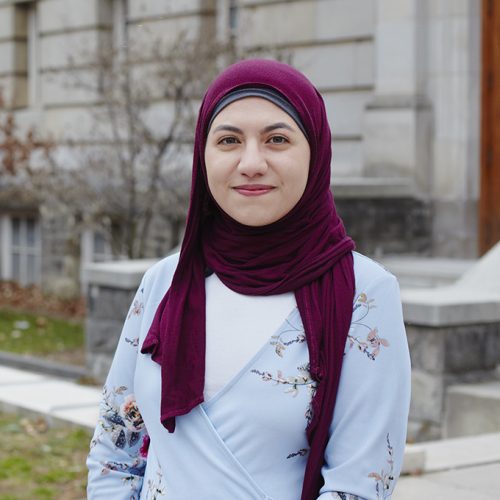Dina Sabie

Dina Sabie
PhD Student, Computer Science
“Having access, physically and online, to almost every book and every academic journal that exists in the world is mind-blowing.”
I earned a bachelor’s degree majoring in Computer Science and Architectural Studies (Design) followed by a professional Master of Architecture degree from the University of Toronto. My award-winning thesis was on designs to equip the UN and other organizations with options for establishing new and improved refugee settlements in the Middle East.
After working for a while, I realized I had a passion for research so I went back to school to pursue further graduate work. I am currently in the Computer Science PhD program, where I focus on social computing.
My research aims to understand the challenges and design computational support that can help refugees integrate faster and better into their new communities. The reason I am pursuing such a field is that I am from Iraqi heritage and most of my relatives still live in Iraq. I have been volunteering with newcomer refugees in my city for the past few years to help them integrate into the community.
Between the refugees here and my relatives in the Middle East, I came to understand the challenges that these people face, and I saw a way technology might be able to help. After finishing my graduate studies, I want to take on a job that has social implications such as teaching individuals about social computing through courses and workshops, and advising people who work with vulnerable populations.
What initially attracted me to U of T’s Computer Science program was its status as one of the top programs in the world and the professors’ strong reputations in their fields. Moreover, the school provides many resources for students to help them in conducting research such as physical, human, and financial assets (though I cannot deny that one the first things that drew me to U of T was the fact that it has many Harry Potter-looking buildings!).
Besides the great faculty members, whom I consider the most valuable resource, the University offers access to many resources such as the equipment and training needed to conduct almost any type of research. For example, the library is impressive. Having access, physically and online, to almost every book and every academic journal that exists in the world is mind-blowing.
My most memorable travel opportunity was when I participated in the Information and Communication Technology for Sustainability (ICT 4 S) Summer School in Leiden, the Netherlands, where I got to meet people from different academic backgrounds and perspectives. I’d advise graduate students to go to workshops and conferences, not just to present, but also to meet and talk with new people. This improves personal communication skills and opens the mind to learning about what others are doing.
I’d also tell future students that it’s okay sometimes to feel lost. This is part of research. Don’t be discouraged at the beginning of your study because you feel you know less than your colleagues. Everybody is different and the research you are doing is probably dissimilar to their work; you’re becoming an expert in your research, not theirs. So, believe in yourself and do your best.
